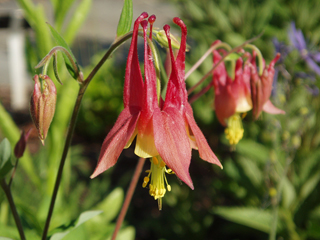This is something I picked up for the end of one pollinator bed that is shaded for over half the day by a sweet gum tree. I planted it in the fall and it’s come out beautifully this spring. It’s good for bees and also for finches, hummingbirds, and it hosts at least one butterfly larva.
Once those blooms open, there will be a nice splash of red in the garden, but I really love the pale, muted color seen now. Read on for special uses as love charm.
More info:

Makin, Julie
Aquilegia canadensis
Aquilegia canadensis L.
Eastern Red Columbine, Wild Red Columbine
Synonym(s): Aquilegia australis, Aquilegia canadensis var. australis, Aquilegia canadensis var. coccinea, Aquilegia canadensis var. eminens, Aquilegia canadensis var. hybrida, Aquilegia canadensis var. latiuscula, Aquilegia coccinea, Aquilegia latiuscula, Aquilegia phoenicantha
USDA Symbol: aqca
USDA Native Status: L48 (N), CAN (N)
This is an erect, branching
perennial, up to 2 ft. tall, well-known for its showy flowers. A nodding, red and yellow flower with upward spurred petals alternating with spreading, colored
sepals and numerous yellow
stamens hanging below the petals. The
compoundleaves, divided into round-lobed threes, are attractive in their own right.
This beautiful woodland wildflower has showy, drooping, bell-like flowers equipped with distinctly backward-pointing tubes, similar to the garden Columbines. These tubes, or spurs, contain
nectar that attracts long-tongued insects and hummingbirds especially adapted for reaching the sweet secretion. It is reported that
Native Americans rubbed the crushed seeds on the hands of men as a love charm. European Columbine (
A. vulgaris), with blue, violet, pink, or white short-spurred flowers, was introduced from Europe and has now become well established in many parts of the East.
Aquilegia canadensis readily hybridizes with the popular Southwestern yellow columbines (
A. chrysantha, etc.), yielding some striking yellow-and-red color combinations in the flowers. This
genus has been referred to as the flower for the masses. Once started, Columbine propagates for years and, although
perennial, increases rapidly by self seeding. (Andy Fyon)
The
genus name Aquilegia comes from the Latin aquila which means eagle and refers to the spurred petals that many believe resemble an eagles talons.





